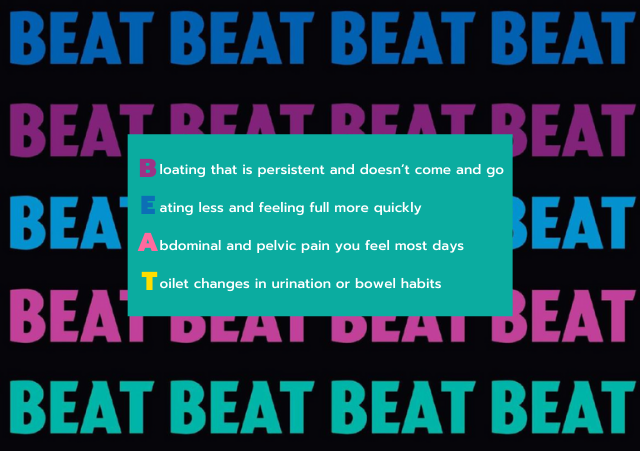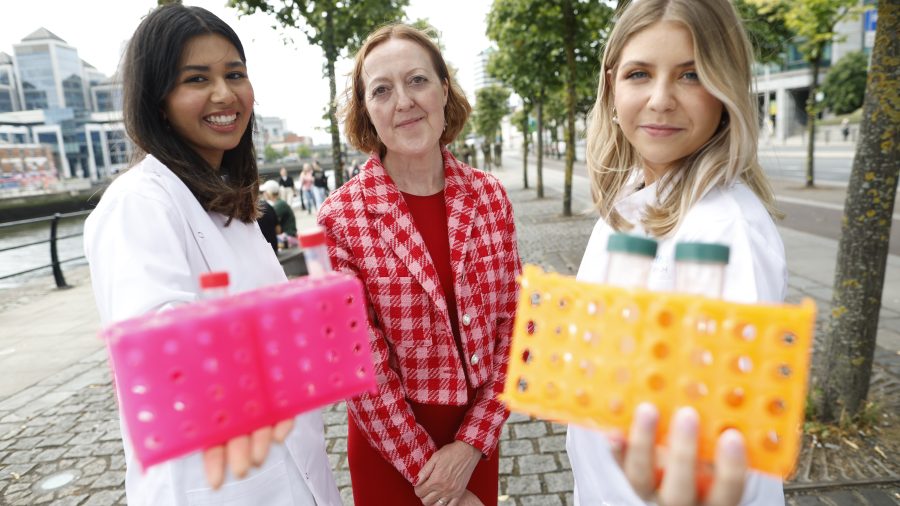
On World Ovarian Cancer Day new research from the Irish Network of Gynaecological Oncology, commissioned by Breakthrough Cancer Research, highlights lack of awareness of symptoms of Ovarian Cancer.
4 out of 5 women in Ireland not confident
in noticing a symptom of Ovarian Cancer
The research conducted by Behaviour & Attitudes is the first significant research ever done into the state of knowledge in Ireland on ovarian cancer. The research highlights that when it comes to recognising the warning signs and symptoms of ovarian cancer:
- 94% of those surveyed could not name change/loss of appetite (eating less) as a symptom
- 97% did not recognise frequent trips to bathroom/needing to urinate often (changes in toilet habits) as a symptom
- 57% did not think that changes in bowel habits could be a sign of ovarian cancer
- Only one in two (51%) think persistent pain and bloating are signs of ovarian cancer
Over 75% of patients present with late-stage disease, partly due to the vagueness of symptoms and the similarity with other conditions such as irritable bowel syndrome (IBS).
Ireland has one of the highest death rates from ovarian cancer in Europe. Approximately 400 women are diagnosed with ovarian cancer each year in Ireland and almost 300 women die every year. Ovarian cancer is the 4th leading cause of cancer death in women in Ireland, after lung, breast, and colorectal cancer.
Early diagnosis can significantly improve survival. 83% of patients diagnosed with stage one ovarian cancer are alive 5 years after diagnosis whereas only 16% of patients diagnosed with stage four ovarian cancer are alive 5 years after diagnosis.[1]
The INGO has launched a campaign to help raise awareness of the symptoms of ovarian cancer and encourage women to contact their GP if they are worried, as early diagnosis saves lives.
The campaign centres around the BEAT symptoms –

The clear message is that if you experience any of these symptoms for three weeks or more, you should contact your GP. The campaign also seeks to dispel the myth that cervical screening detects ovarian cancer.
Donal Brennan, Professor for Gynaecological Oncology at UCD and Academic Lead of the UCD Gynaecological Oncology group, the Mater Misericordiae and St Vincent’s University Hospitals, said, “It is important to develop a shared vocabulary with patients to ensure patients understand the BEAT symptoms and we discuss it using appropriate language. Cervical smears are not used to detect ovarian cancer. There are no accurate tests and that is why we want people to be aware of the BEAT symptoms. If the symptoms persist for three weeks or more you must contact your GP. It is also worth checking out www.thisisGO.ie as there is lots of information and very helpful resources there.”
Ovarian cancer survivor Melissa Harris, said, “I have never felt more passionate about anything than the importance of raising awareness of the symptoms of ovarian cancer. I work as a hairdresser and so many of my clients asked was it found when I had a smear. So many women have symptoms, get a smear and are relieved when it’s okay and push it to the side – it’s scary. And a lot of women think ovarian cancer only affects older women. You need to listen to your body and make sure you’re aware of the BEAT symptoms.”
Dr. Sharon O’Toole, Senior Research Fellow in Trinity College Dublin and Coordinator of the World Ovarian Cancer Day campaign at INGO, said, “Ireland has one of the highest proportions of women diagnosed at an advanced stage (71%), compared with only 13% diagnosed at an early stage. The Irish Network for Gynaecologic Oncology believes in the power of working together to improve women’s lives. There is no screening test for ovarian cancer but we all can be more symptom aware. The symptoms of ovarian cancer can often be confused with irritable bowel syndrome, and we need to get the BEAT message out there so women know that if they experience any of the symptoms for three weeks or more, they should contact their GP.”
Two leading Irish artists have also joined the campaign to help spread the word on the signs of ovarian cancer –
- Artist and fashion designer, Helen Steele, has designed an eye-catching tote bag and postcard using effective repetition of the word BEAT – highlighting our need to constantly repeat the symptoms in order to increase awareness and save lives.
- Poet Laurate for Wexford, Sasha Terfous has written and performed a powerful spoken word piece featuring Melissa Harris, Deirdre O’Raw, Kat Shelley and Ingrid Halligan Dune, and entitled BEAT, focussing on the symptoms of ovarian cancer and the experience of women’s ovarian cancer diagnosis.
The Irish Network for Gynaecological Oncology is a voluntary coordination body and consists of thirty of Ireland’s foremost gynaecological cancer campaigners, researchers, and patient advocates, listed below. The aim of the group is to raise awareness of gynaecological cancers across the island of Ireland. The group participates in two major international events annually: World Ovarian Cancer Day on May 8th and World Gynaecological Cancer Day on September 20th.
Spread the message using the hashtags #WOCD2022 #NOWOMANLEFTBEHIND
[1] National Cancer Registry Ireland, 2021
Additional Information
The Irish Network for Gynaecological Oncology (INGO) Members
ARC Cancer Support Centres, Dublin; Answers for Cancer Podcast team; Breakthrough Cancer Research; Cancer Care West; Cancer Trials Ireland; CERVIVA; Circle of Friends Cancer Support Centre; Coombe Women & Infants University Hospital, Dublin; Cork ARC Cancer Support; Cork Cancer Care Centre; East Galway and Midlands Cancer Support Centre; Emer Casey Foundation; Irish Cancer Society; Irish Society of Gynaecological Oncology; Karen Fenton Ovarian Cancer Fund; Lynch Syndrome Ireland; Marie Keating Foundation; Mater Hospital Dublin; National Cancer Control Programme; National Immunisation Office; National Women’s Council of Ireland; OvaCare; Pink Ladies Cancer Charity; Purple House Cancer Support; Queens, Belfast; Sláinte an Chláir; Sligo Cancer Support; SOCK; Swell Fermanagh Cancer Survivorship Group; St. James’s Hospital Foundation (GynaeCancerCare); Trinity College Dublin; Trinity St. James’s Cancer Institute; University College Dublin School of Medicine; and 221+ CervicalCheck Patient Support Group.
Behaviour & Attitudes Survey
The ovarian cancer research was conducted by Behaviour & Attitudes and is the first significant research ever done into the state of knowledge in Ireland on ovarian cancer. Fieldwork on the study ran from 13/04/2022 to 25/04/2022. The identity of the commissioning client was not disclosed to enhance objectivity.
The sample was interviewed online and used quota controls to ensure it was representative of all women over the age of 40. Quota parameters (gender, age group, region, and area) were established based upon the latest census of population as well as industry-agreed estimates in respect of socio-economic class. Participants are members of Behaviour & Attitudes Acumen online panel. At a sample size of 400, the data can be deemed accurate to within a margin of error of +/- five percentage points.
Acknowledgements
OvaCare, East Galway and Midlands Cancer support and the Emer Casey Foundation are grateful for the support received from AstraZeneca, GlaxoSmithKline, Abbott, Roche, and the Irish Cancer Society towards the World Ovarian Cancer Day campaign. The INGO acknowledge the support of Breakthrough Cancer Research who commissioned the research survey for the campaign.
Donate Now












 Contact
Contact